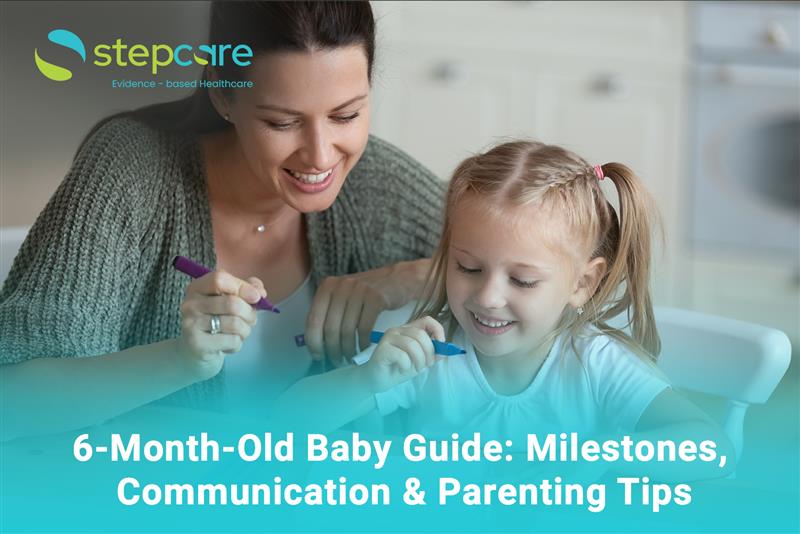- Stepcare’s mission is to help you achieve optimal health and well-being, not just for your benefit but for ours too - because we believe that a healthy you is a win-win situation for both you and Stepcare

Stepcare delivers personalised, evidence-based, and preventative healthcare that prioritises patient well-being and promotes healthier living.
G-01, Ground floor, Brigade IRV Center, Nallurhalli, Whitefield, Bengaluru, Karnataka, 560066
Subscribe for newsletter

Can you believe it? Your little one is already six months old! By this age, many babies are becoming far more interactive, playful, and curious about the world around them. This stage is full of discoveries—rolling, laughing, babbling, and reaching out for anything that catches their eye.
Remember, every baby grows at their own pace. Some may reach a skill a little earlier, while others may reach it later. What matters most is steady progress and enjoying this journey together.
At this age, 6-month-old baby milestones are all about coordination, strength, and curiosity. Here’s what you might notice:
Parent Tip: Offer safe teething toys, soft rattles, and household-safe objects (like wooden spoons) for exploration. Babies don’t need fancy equipment—they need variety, textures, and lots of safe space to move.
6-month-old baby development also shines in social and language skills. At this stage, your little one is starting to communicate more intentionally:
Parent Tip: Respond to every attempt at communication, even if it’s just a squeal or babble. Babies learn language through the back-and-forth rhythm of conversation.
Wondering how to play with a 6-month-old baby? You are your baby’s favorite “toy.” Interaction and play are what help them learn most. Try these activities:
These are fun activities for a 6-month-old baby that strengthen development while deepening your bond.
Parent Tip: Babies love exaggerated faces and playful voices. Don’t be afraid to sound silly; it captures their attention and encourages them to copy you.
Eye contact is an important part of social development. You can encourage it by:
If your baby doesn’t enjoy eye contact, be patient. Keep interactions gentle and positive.
Introduce your baby to different sounds:
Every child grows differently, but it’s a good idea to speak to your health visitor or pediatrician if your 6-month-old:
At six months, your baby is curious, playful, and eager to explore the world through touch, sound, and your loving interaction. What is the best way to support their growth? Spend time together. Talk, sing, cuddle, play, and watch your baby’s personality unfold day by day. These moments of connection lay the foundation for confidence, joy, and a lifelong love of learning.
Authored with content written by Dr. Debarati Das.